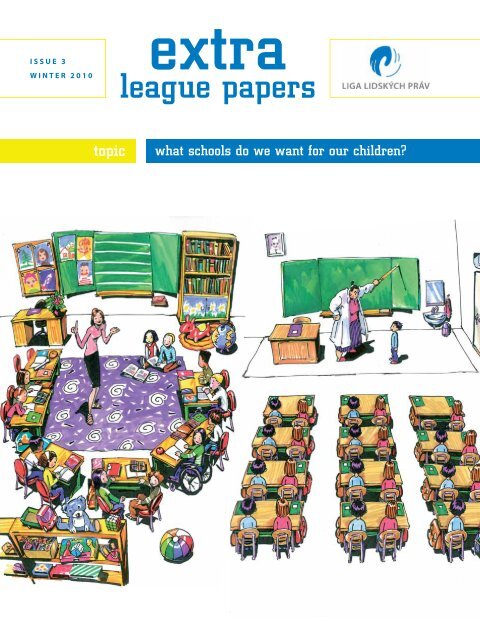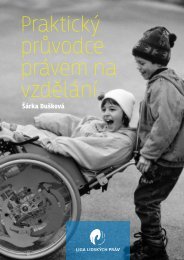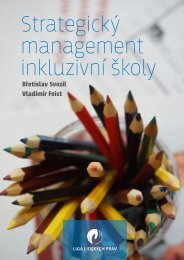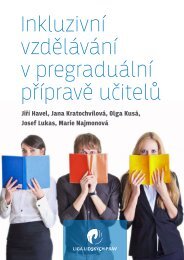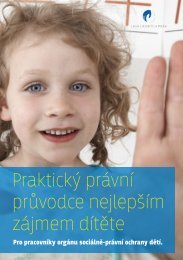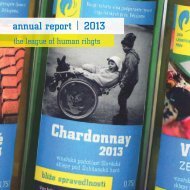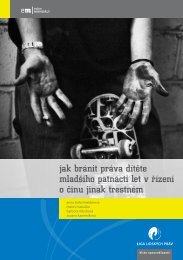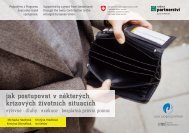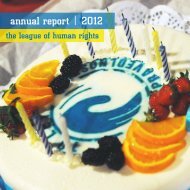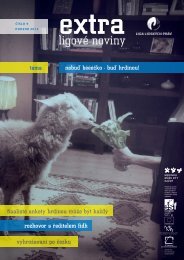EXTRA league papers | issue 3 | winter 2010 | What Schools Do We Want for our Children?
Create successful ePaper yourself
Turn your PDF publications into a flip-book with our unique Google optimized e-Paper software.
ISSUE 3<br />
WINTER <strong>2010</strong><br />
topic<br />
extra<br />
<strong>league</strong> <strong>papers</strong><br />
what schools do we want <strong>for</strong> <strong>our</strong> children?
2<br />
introduction<br />
Olga Kusá, educational specialist in the Inclusive<br />
Education Support Centre in Brno<br />
we should have<br />
diversity in<br />
schools… or did i<br />
go mad?<br />
I like my job. I really do. Thanks to my<br />
job I got to know those schools where<br />
diversity is accepted, respected and<br />
even welcomed as good experience and<br />
benefi cial <strong>for</strong> all. But just like all other<br />
jobs it has its dark side that can get on<br />
my nerves!<br />
Have you ever wondered how some people<br />
can be so thick-headed? Have you ever felt you<br />
were the only one trying to make something<br />
happen? Have you ever felt like exploding<br />
because you were being told again and again<br />
why some things cannot be done instead of<br />
trying to fi nd solutions? <strong>What</strong> can surely make<br />
me see red is the stiff ness of opinions of education<br />
workers whose simplifying and black<br />
and white judgements aff ect the education of<br />
“diff erent” children. Psychologists and specialized<br />
teachers are the ones who establish the<br />
“diagnosis”, on which basis a child is recommended<br />
<strong>for</strong> integration into a regular school or<br />
sent to a special school. Educational counsellors<br />
cooperate with teachers and advise them<br />
how to work with children who have a learning<br />
disability. These people can have an essential<br />
impact on the future of children and their authority<br />
can aff ect the minds of teachers. I have<br />
recently had an opportunity to participate in<br />
a discussion between educational counsellors<br />
and teachers at a standard elementary school.<br />
The subject of the discussion was the education<br />
of so-called problematic pupils. I was happy<br />
about the event, I was interested in the problems<br />
teachers had and curious to know how<br />
the educational counsellors would deal with<br />
the multitude of questions and complaints.<br />
But to my bitter disappointment, at the very<br />
beginning the lead psychologist unblinkingly<br />
said: “It is a shame that it is no longer allowed to<br />
send border children to <strong>for</strong>mer special schools.<br />
Such children will now come fl ooding into y<strong>our</strong><br />
schools! I am really curious to see how you will<br />
manage it.”<br />
Imagine my despair, my job is to motivate teachers<br />
not to give up on and get rid of less able<br />
children, no matter how diffi cult the work with<br />
them can be. “Border children” is a simplifi ed<br />
term describing children whose results in IQ<br />
tests border on mild intellectual disabled. These<br />
children do not do well in school and there<br />
are many reasons why it is so. However, I think<br />
that these children do not belong to schools<br />
<strong>for</strong> the intellectually disabled.<br />
Nevertheless, the discussion goes on. And with<br />
it come other shocking words spoken by an<br />
educational counsellor: “It is time we really started<br />
to fear children with behavi<strong>our</strong>al disorders,<br />
as their number rises. An unruly child cannot be<br />
changed, nothing works <strong>for</strong> them.”<br />
But the best of educational optimism is yet to<br />
come: “There is nothing you can do with border<br />
children; they will not start getting better. Let<br />
them fail the end of year exams and they might<br />
end up at a special school anyway.”<br />
This experience was stuck in my head long afterwards<br />
and I was thinking about the psychologist.<br />
A change can be diffi cult and attitudes<br />
are especially hard to change. Maybe she has<br />
twenty or thirty years of experience, feels sure<br />
about what she does and nothing can easily<br />
surprise her. “It has been working fi ne until now,<br />
so what do you want?!” “A change?” I ask. Or did<br />
I really go mad?<br />
Lucie Obrovská, lawyer of the Equal Opportunities<br />
Department of the Offi ce of the Public Defender<br />
of Rights<br />
three year “anniversary”<br />
of the<br />
d. h. verdict: have<br />
we moved on?<br />
The Czech Republic has committed to<br />
ensuring equal access to education. Since<br />
last year this right has been grounded<br />
not only in the Charter of fundamental<br />
rights and basic freedoms, education<br />
rules and international obligations but<br />
also in the Anti-discrimination Act.<br />
When non-governmental organizations recently<br />
criticized the Minister of Education <strong>for</strong> his<br />
indifference towards the <strong>issue</strong> of integration<br />
and inclusion, they pointed out the possibility<br />
of another action being brought against the<br />
Czech Republic at the European C<strong>our</strong>t of Human<br />
Rights in Strasb<strong>our</strong>g. In 2007 in the case of D.<br />
H. and others vs. the Czech Republic the same<br />
c<strong>our</strong>t stated that we discriminate against Roma<br />
children because we do not provide them with a<br />
standard quality education, i.e. education given<br />
to non-Roma children. Instead, a great number<br />
of Roma children are placed in non-standard<br />
schools. But according to the current legislation,<br />
only disabled children should be provided with<br />
such education. In <strong>We</strong>stern countries it is quite<br />
common that emphasis is put on coeducation<br />
of all children, regardless of their disability. Inclusion<br />
is good not only <strong>for</strong> the education of the<br />
diff erent, disabled child but it also improves the<br />
child’s relationship with majority children, who<br />
thus learn tolerance.<br />
Special changes at special schools or<br />
Czech-style inclusion<br />
Although special schools were to be removed<br />
from the education system, anyone in this fi eld<br />
will confirm that the change of the schools’<br />
naming was merely symbolic. Special schools<br />
were renamed practical elementary schools but<br />
the change in the concept of education, which<br />
would support the inclusive approach, did not<br />
happen. It is appalling that three years later legal
epresentatives of Roma children can still claim<br />
compensation <strong>for</strong> an unequal access to education.<br />
Apart from this, they can also bring an action<br />
to c<strong>our</strong>t on the basis of the Anti-discrimination<br />
Act. For now, the use of the Act is rather scarce.<br />
<strong>We</strong> have to realize that the inclusive approach to<br />
education is not merely a moral challenge presented<br />
by some experts, parents or non-profi t<br />
organizations. The School Act itself supports an<br />
interpretation, which says that in cases in which<br />
it is benefi cial to the pupil to be included in the<br />
mainstream education this has to be done.<br />
One of the educational principles is an individual<br />
approach to every pupil and their educational<br />
needs. Apart from this, one of the education<br />
regulations explicitly states that in case of<br />
agreement with the child’s interests, the State is<br />
obligated to provide the child with a standard<br />
education. It is there<strong>for</strong>e necessary to incessantly<br />
remind people that the inclusive approach is<br />
not a surreal wish expressed by academics but<br />
that it is a legally binding concept, supported by<br />
the Strasb<strong>our</strong>g verdict and education rules.<br />
A so-called reintegration should be a natural<br />
part of the inclusive approach. The decision to<br />
place a child in a special school upon the recommendation<br />
of a psychologist should not be defi<br />
nite, on the contrary, they should be continuously<br />
watched and, if the situation changes, sent<br />
back to a standard elementary school. In addition,the<br />
teachers should be ready to provide the<br />
disabled children with appropriate support.<br />
Inclusion is <strong>for</strong> all, not only <strong>for</strong> Roma<br />
Non-governmental organizations, many experts<br />
and international institutions, including<br />
the European Commission against Racism and<br />
Intolerance are expressing alarm at the fact that<br />
the implementation of changes towards Roma<br />
education solutions has been stopped. The current<br />
Minister of Education refuses to support the<br />
changes that were prepared and partly implemented<br />
by the previous governments. <strong>We</strong> have<br />
to realize that the concept of inclusive education<br />
is much broader. It concerns not only Roma children<br />
but all disabled children as well. It includes<br />
quality education <strong>for</strong> ethnic minority children<br />
but it is also important to put maximum eff ort<br />
into integration of all children into standard<br />
schools and classes. The inclusive education system<br />
has the potential to off er quality education<br />
to any pupil but it also has a considerable socializing<br />
function at schools and in classes attended<br />
by mentally or physically disabled children and<br />
able-bodied children together.<br />
The Czech Republic is obligated to ensure the<br />
highest possible quality of education to all children,<br />
so it must be pointed out that the criticism<br />
on the part of organizations <strong>for</strong> protection of the<br />
human rights of disabled people is more than<br />
relevant. It is not a mere moral challenge but a<br />
serious legal obligation, which the State is obligated<br />
to fulfi l as the Czech Republic has ratifi ed<br />
the UN Convention on the Rights of Persons with<br />
Disabilities. The discussion about insufficient<br />
integration of disabled children, of children from<br />
<strong>for</strong>eign families or otherwise disadvantaged<br />
children is there<strong>for</strong>e as relevant as the discussion<br />
about the education of Roma children.<br />
Verdict, and what is to follow?<br />
The fact that Roma children are discriminated<br />
against by the Czech Republic has been pointed<br />
out <strong>for</strong> a long time. That the education off ered<br />
in the <strong>for</strong>mer special schools does not provide<br />
adequate knowledge and skills needed to succeed<br />
at lab<strong>our</strong> market is beyond question. It is true<br />
that the Roma are very often unrightfully placed<br />
outside the mainstream. Non-standard education,<br />
i.e. education not at a regular elementary<br />
school, is intended <strong>for</strong> intellectually disabled<br />
children only. People with mild intellectual disability<br />
represent about 3 per cent of the population;<br />
it is there<strong>for</strong>e exceedingly disproportionate that 30<br />
per cent of Roma children are educated at <strong>for</strong>mer<br />
special schools. This fact had been pointed out<br />
by Czech non-governmental organizations long<br />
be<strong>for</strong>e the a<strong>for</strong>e-mentioned verdict was reached<br />
but un<strong>for</strong>tunately it had no impact on the actions<br />
taken by the Czech state authorities. This<br />
made the Strasb<strong>our</strong>g verdict, which emphasizes<br />
the human rights violation committed by the<br />
Czech Republic, all the more important. The<br />
c<strong>our</strong>t has repeatedly highlighted the segregation<br />
of the Roma, as it stated that neither Croatia<br />
nor Greece are able to provide equal educational<br />
opportunities <strong>for</strong> young Roma.<br />
The D. H. verdict puts emphasis on two essential<br />
aspects of the problem: (a) the lack of in<strong>for</strong>med<br />
consent of the Roma parents to their child’s<br />
placement outside the educational mainstream<br />
and (b) doubts as to the adequacy of tests<br />
used by pedagogical-psychological counselling<br />
centres. The c<strong>our</strong>t states that these tests are culturally<br />
prejudiced. This means that worse results<br />
achieved by Roma children do not stem from<br />
their own inability but from a diff erent cultural<br />
and social background. The c<strong>our</strong>t also believes<br />
that racial prejudices on the part of responsible<br />
people play an equally important role in sorting<br />
Roma children. This surely is a bold proclamation<br />
but if it is not true, we have to ask <strong>our</strong>selves,<br />
what causes the disproportionate number of<br />
Roma children at special schools.<br />
Has there been any change at all since the<br />
verdict was reached three years ago? The same<br />
Roma children who were placed outside the<br />
educational mainstream be<strong>for</strong>e the verdict, continue<br />
to be educated at these non-standard or<br />
“ghetto” schools. The work of pedagogical-psychological<br />
counselling centres did not undergo<br />
any considerable change either from the point<br />
of view of legislation or concerning personnel.<br />
This means that we still wrongfully send Roma<br />
children to such schools and classes that neither<br />
prepare them <strong>for</strong> everyday life nor provide them<br />
with quality education.<br />
<strong>What</strong> did the Czech School Inspectorate<br />
fi nd out?<br />
Exactly a year ago I carried out an analysis <strong>for</strong><br />
the Czech Helsinki Committee, in which I tried<br />
topic<br />
to assess the progress we made in following the<br />
“Strasb<strong>our</strong>g dictate”. One year later I must say<br />
that the situation has not improved although<br />
some changes have occurred. For example, the<br />
Czech School Inspectorate started to cooperate<br />
with non-governmental organizations and<br />
actively approached the burning questions<br />
concerning the education of the Roma and I<br />
was invited to participate in its investigations.<br />
Observations made at special schools confi rm<br />
what the non-governmental organizations have<br />
long been pointing out: that the representatives<br />
of special schools cannot be expected to show<br />
self-criticism and eff orts to reduce the number<br />
of children placed in special schools. It is an essential<br />
matter of their existence.<br />
But there were some aspects of the problem that<br />
the Inspectorate could not observe. It is impossible<br />
to exactly observe the parents’ consent to<br />
their child’s placement outside the educational<br />
mainstream although it is imposed by law. The<br />
legislation requires that in<strong>for</strong>med consent is<br />
obtained but in practice, parents are rarely in<strong>for</strong>med.<br />
However, in the near future a ministry<br />
guideline is to be <strong>issue</strong>d, which would deal with<br />
the question of in<strong>for</strong>med consent. Presently,<br />
it is the usual practice that the parent merely<br />
signs school-prepared documents as a sign of<br />
their consent. It is there<strong>for</strong>e difficult to assess<br />
to what extent the parents are in<strong>for</strong>med about<br />
the consequences of their child’s placement in a<br />
special school.<br />
Nevertheless, the Inspectorate could and did<br />
find out that the head teachers themselves<br />
violate the rules. Apart from the in<strong>for</strong>med consent,<br />
another condition of a child’s placement<br />
in a special school is a diagnosis of intellectual<br />
disability. The diagnosis is established by a pedagogical-psychological<br />
counselling centre or<br />
by a specialized pedagogical centre. The Inspectorate<br />
observed that in many cases the head teacher<br />
decided on a child’s placement in a special<br />
school without presenting such diagnosis. This is<br />
a very serious failure because the head teacher is<br />
the decision-making state authority and should<br />
be held responsible <strong>for</strong> such a situation.<br />
Equal access to education still beyond<br />
horizon<br />
Among children who are educated according<br />
to lower standards, the Roma children are the<br />
majority. The situation is the same concerning<br />
the number of diagnoses made by pedagogical<br />
counselling centres. Let us not pretend that the<br />
results are accidental. In a democratic country<br />
it is out of bounds to accept a thesis that claims<br />
that the number of intellectually disabled individuals<br />
is considerably higher in one ethnic group<br />
than in another. The core of the problem is more<br />
likely to be found in the selection of tests used<br />
Continued on page 4.<br />
3
4<br />
you decide!<br />
Jennifer Clark, author is a law student at Albany<br />
Law School, New York<br />
education as a fundamental<br />
human<br />
right vs. exclusion<br />
of disabled children<br />
Education is the vehicle <strong>for</strong> which children<br />
learn and establish the skills necessary<br />
to develop and grow. Education is<br />
also the foundation from which social interactions<br />
and self-empowerment stem.<br />
And despite education being critical to<br />
proper development, children with disabilities<br />
continue to face discrimination in<br />
the educational setting.<br />
The United Nations Convention on the Rights<br />
of Persons with Disabilities, which came into<br />
<strong>for</strong>ce in 2008, was drafted as a supplement to<br />
the Universal Declaration of Human Rights in an<br />
eff ort to protect individuals with disabilities. To<br />
date, there are 146 signatories to the Convention<br />
and 90 ratifi cations. The Convention recognizes<br />
that the term “disability” is evolving but notes<br />
that it typically includes individuals with longterm<br />
physical, mental, intellectual, or sensory<br />
impairments.<br />
There is estimated to be more than 650 million<br />
Continued from page 3.<br />
by the counselling centres, in the lack of quality<br />
personnel in the centres but also in the lack of<br />
motivation on the part of elementary schools<br />
to educate the Roma. This year the Inspectorate<br />
presented these observations to the Public Defender<br />
of Rights to decide whether or not this<br />
was a case of discrimination of the Roma. Three<br />
years after the Strasb<strong>our</strong>g verdict the ombudsman<br />
again confi rmed that unlawful activities<br />
still go on in the Czech education system, that<br />
we still discriminate against the young Roma.<br />
Is there anything positive we can say by way of<br />
in the world living with disabilities and many<br />
encounter obstacles which prevent them from<br />
receiving an education similar those who do not<br />
have a disability. Research has showed that people<br />
with disabilities are more likely to be poor<br />
and as such, they lack access to educational<br />
services. Statistics demonstrate that 19 per cent<br />
of less educated people have disabilities and<br />
11 per cent of better educated individuals have<br />
disabilities.<br />
In lieu of the Convention and ratifi cation by 90<br />
state parties, many countries have also implemented<br />
their own disability discrimination acts.<br />
The need to enact legislation is clear: 90 percent<br />
of children with disabilities in developing<br />
countries do not attend school. In the United<br />
Kingdom <strong>for</strong> example, the Disability Discrimination<br />
Act prohibits discrimination in schools<br />
and requires public entities to promote equal<br />
opportunities <strong>for</strong> individuals with disabilities.<br />
Some of the equal opportunities include access<br />
to public transportation and facilities and other<br />
educational services.<br />
In Scotland, the Disability Discrimination Act<br />
makes it unlawful <strong>for</strong> a school to discriminate<br />
against disabled individuals. The Act applies<br />
to all schools, not just state-funded schools.<br />
The obligations imposed on schools, however,<br />
do not apply to teaching aids and services.<br />
Instead, the Act applies to policies and procedures<br />
which may keep children with disabilities<br />
separate from those who do not have them.<br />
Compensation <strong>for</strong> claims of discrimination is not<br />
permissible in Scotland.<br />
conclusion? I hardly think so. Unlike last autumn,<br />
nowadays the question of inclusion has no political<br />
support. The Czech Republic still does not<br />
fulfi l its legal obligations, and there<strong>for</strong>e it would<br />
come as no surprise if there were more suits,<br />
guilty verdicts and penalties. The only surprise<br />
could be whether the action is brought by a<br />
Roma pupil or by a physically disabled child. But<br />
what worries me more is the fact that wrongfully<br />
segregated children still cannot go back to<br />
elementary schools. Another very distressing<br />
fact is that the Roma children are still excessively<br />
The United States has very detailed regulations<br />
ensuring those with disabilities are treated fairly<br />
and have equal educational opportunities. The<br />
Individuals with Disabilities Education Act was<br />
passed in 1975 and prior to its passage, at least<br />
one million children with disabilities in the United<br />
States were denied public education. The<br />
Act specifi cally addressed the educational needs<br />
of children with disabilities from birth to age 21.<br />
The Act requires that education-related services<br />
are designed to meet the unique learning needs<br />
of eligible children and schools are also required<br />
to create an individualized education program<br />
<strong>for</strong> each student. The Act also requires adequate<br />
services be provided, including transportation<br />
to and from school, speech-language pathology,<br />
psychological services, physical therapy, and<br />
recreation.<br />
<strong>Schools</strong> throughout the world are moving towards<br />
more inclusive environments which support<br />
children with disabilities. Many policies now<br />
prohibit authorities from denying children with<br />
disabilities admittance to school. Other regulations<br />
prohibit school authorities from allowing<br />
children with disabilities access to services and<br />
benefi ts off ered to students without disabilities.<br />
Despite the changes being made, many children<br />
are still discriminated against once they arrive at<br />
school. It is imperative that those with disabilities<br />
have the same opportunities to excel as those<br />
who do not have a disability, especially since<br />
education is recognized as a fundamental right.<br />
Education as a fundamental right vs. exclusion of<br />
children with disabilities: You decide.<br />
s<strong>our</strong>ce: www.isifa.com<br />
placed in <strong>for</strong>mer special schools, which further<br />
widens the social gap existing in Czech society.<br />
And it is clear that if we do not provide the Roma<br />
children with a chance to get better education,<br />
they will hardly learn self-reliance and independence<br />
from state assistance. Moreover, the<br />
current state of aff airs is exceedingly expensive<br />
<strong>for</strong> the State and it unnecessarily heightens<br />
social tension.<br />
The author is a close collaborator of the League of<br />
Human Rights
Michaela Tetřevová, lawyer of the League of Human<br />
Rights<br />
how does the system<br />
of threatened<br />
children care fail?<br />
the story of a family and their three-year struggle<br />
to get their children back in their care<br />
The Czech Republic has long been criticized<br />
by international organizations<br />
<strong>for</strong> the high number of children living<br />
in state institutions. More than 21,000<br />
children spend their childhood in such<br />
institutions. This number means that we<br />
are one of the leading countries with regard<br />
to the number of institutionalized<br />
children.<br />
<strong>What</strong> are the causes of this desperate<br />
state? The State fails mainly in providing<br />
preventive help to threatened families.<br />
Instead of helping parents in crisis, the<br />
State chooses to punish them by taking<br />
their children away. <strong>Children</strong> are often<br />
taken away from their parents with surprising<br />
rapidity. Getting them back can<br />
prove an extremely long and arduous<br />
task.<br />
Mr and Mrs Stejskal know all about this. Their<br />
two little daughters have been living in a state<br />
institution <strong>for</strong> two years now. The social services<br />
workers took them away after one night when<br />
the girls were left home alone. When they could<br />
not fi nd their mother, they went out on a balcony<br />
and called her. A municipal police patrol<br />
who happened to pass by noticed the crying<br />
children and notifi ed the child protection authority.<br />
The negligent parents were punished<br />
immediately. The next day the Stejskals were<br />
visited by a social services worker who took<br />
the children away. For a couple of months the<br />
girls were living with their grandmother and<br />
were seeing their parents regularly. Then, it got<br />
diffi cult <strong>for</strong> the grandmother to take care of two<br />
little children so they went to a state institution.<br />
The institution where the girls are living now is<br />
about 55 miles away from their parents’ home.<br />
Of c<strong>our</strong>se, there are state institutions which<br />
would be closer. But all of them were full at<br />
the time the girls’ placement was decided. No<br />
wonder, if we consider how many children live<br />
in state institutions! The considerable distance<br />
that separates the Stejskals from their daughters<br />
disrupts the family relationships. Both parents<br />
work full time in three-shift operation, so<br />
they are unable to see their daughters regularly.<br />
<strong>Children</strong> suff er in state institutions but<br />
c<strong>our</strong>ts are at ease<br />
The litigation concerning the institutionalization<br />
of the girls has been going on <strong>for</strong> three<br />
years and a decision is not going to be reached<br />
soon. To make things worse, education at a state<br />
institution begins to negatively aff ect the girls.<br />
The seven-year old Michaela is very friendly to<br />
everybody, and if somebody told her to come<br />
home with them, she would not hesitate. In<br />
contrast, younger Pavlína, who has been living<br />
in the state institution since the age of two and<br />
can remember nothing but the state institution,<br />
is distrustful and resentful.<br />
Several studies have already proved that children<br />
who are brought up in state institutions<br />
are more likely to have growth disorder, and<br />
have behavi<strong>our</strong>al disorders and low social and<br />
intellectual skills. Only one in 171 children<br />
growing up in a state institution gets a university<br />
degree. Other research shows that 56 per<br />
cent of children, who leave the state institution<br />
after they turn 18, commit a criminal off ence.<br />
But it seems that in case of the Stejskal family,<br />
the c<strong>our</strong>t does not take into consideration the<br />
negative aspects of state care. Instead of acting<br />
quickly and in the best interest of the child,<br />
it is not unusual that time periods separating<br />
the c<strong>our</strong>t proceedings go up to two months. It<br />
looks like time goes slowly in a c<strong>our</strong>t building,<br />
whereas with small children, just like Michaela<br />
and Pavlína, time fl ies fast.<br />
The Stejskals have been litigating a claim to get<br />
their children back <strong>for</strong> 1,088 days now. It is their<br />
bad luck that the c<strong>our</strong>t proceedings have been<br />
brought in the Northern Bohemia Region. These<br />
c<strong>our</strong>ts are well-known <strong>for</strong> their slow proceedings<br />
concerning the care of minors. In 18 per<br />
cent of cases the proceedings last <strong>for</strong> 6 months<br />
to 1 year. In 20 per cent of cases the proceedings<br />
go on <strong>for</strong> 1 to 3 years, which is the highest number<br />
in the Czech Republic.<br />
But the situation in other regions is no better.<br />
Long c<strong>our</strong>t proceedings represent a problem<br />
within the whole system. The Civil Procedure<br />
Code, which deals with proceedings concerning<br />
care of minors, un<strong>for</strong>tunately does not defi ne<br />
any period within which the c<strong>our</strong>ts should reach<br />
a decision. There only exist a 24-h<strong>our</strong> period<br />
<strong>for</strong> issuing a preliminary measure that places<br />
children in state institutions. But the preliminary<br />
measure is to be used in an emergency, in<br />
cases where the children are ill-treated, sexually<br />
abused or left with no one to look after them,<br />
and there<strong>for</strong>e it is necessary to act quickly. Un<strong>for</strong>tunately,<br />
in practice, the preliminary measure<br />
is often misused in cases of long-term family<br />
troubles.<br />
case<br />
Social services workers inspect and threaten<br />
but do not help<br />
This was the case of the Stejskals as well. The<br />
department of social services opened a fi le on<br />
Michaela and Pavlína in 2004. This was when<br />
problems fi rst occurred in the family. Mr Stejskal<br />
liked to have a drink in a pub and his wife used<br />
to go and pay his bills, when he drank more that<br />
he could pay <strong>for</strong>. When Mrs Stejskal used to go<br />
and pay her husband’s bill, the kids were left<br />
home alone. But Mrs Stejskal too liked to drink<br />
a little sometimes. One time, after she had been<br />
celebrating with a friend, she went to see her<br />
friend off and she shut herself out of doors. The<br />
eighteen-month-old Michaela was left home<br />
alone and fi re fi ghters had to help Mrs Stejskal<br />
open the apartment door again.<br />
So the Stejskals were visited by a social services<br />
worker several times. However, her visit always<br />
included a mere <strong>for</strong>mal inspection. In fifteen<br />
minutes she ran through the apartment, checked<br />
whether the fridge contained enough food,<br />
whether the clothes were nicely tidied in closets,<br />
whether the fl oor was well swept and whether<br />
the children were appropriately dressed.<br />
Then she simply in<strong>for</strong>med the parents that they<br />
should improve the education of their children<br />
and threatened to take the kids away. That was<br />
the end of any further communication with the<br />
family. The Stejskals never learned what they<br />
should improve in particular, and when.<br />
On the contrary, in the Netherlands and the United<br />
Kingdom it is common that if a family gets<br />
into trouble, a social services worker will call a<br />
family conference, at which the wider family<br />
gathers. Together they try to come up with an<br />
individual plan, which would comprise particular<br />
measures and tasks and a time schedule<br />
to go according to. The duties resulting from<br />
the individual plan, which has been drawn up<br />
by the whole family, are easily understandable<br />
<strong>for</strong> everybody and are not seen as an inimical<br />
intervention in family life. This contributes to a<br />
higher motivation of the family <strong>for</strong> keeping to<br />
the proposed plan. Moreover, the family eff ort<br />
is supported by a continuous evaluation, when<br />
the family and the worker discuss the measures<br />
that were successfully adopted and those that<br />
need to be yet taken.<br />
Continued on page 7.<br />
5
6<br />
interview<br />
questions <strong>for</strong>…<br />
…Josef <strong>Do</strong>beš, the Minister of Education<br />
How do you think an ideal school <strong>for</strong> y<strong>our</strong> children<br />
should look like?<br />
Above all, it would be a friendly environment<br />
created by teachers, parents and children. It<br />
would be a school where children could be freely<br />
educated without being manipulated. And<br />
at the same time it would be a safe place where<br />
children could explore all their possibilities.<br />
Candidates <strong>for</strong> the “Fair School” Award<br />
are better and better<br />
In the past month LIGA teachers visited new<br />
schools, which aim to be awarded the Fair School<br />
Certifi cate. They travelled the whole country<br />
and returned home satisfi ed. “I was pleasantly<br />
surprised by the high level of application of inclusive<br />
principles at schools. Most schools try to<br />
put into practice the philosophy and principles of<br />
equal access to education,” says Monika Tannenbergerová.<br />
At present, fi fteen schools from all<br />
over the Czech Republic have applied <strong>for</strong> the<br />
Certifi cate and applications still keep coming.<br />
Our pedagogical-legal team explains to the<br />
schools what they can expect and clarifi es any<br />
possible ambiguities. Throughout the year we<br />
counsel the schools engaged in the project and<br />
we watch how the inclusion goes at the schools.<br />
Whether the Certificate is awarded or not is<br />
decided by an independent board of experts.<br />
LIGA awards the Fair School Certifi cate to those<br />
schools that promote a fair approach to all pupils<br />
regardless of their handicap, special skills or<br />
skin col<strong>our</strong>. Since 2009 ten schools were awarded<br />
the Certifi cate and other schools joined the<br />
project this year.<br />
<strong>What</strong> do you think about inclusive education as a<br />
system? <strong>What</strong>, in y<strong>our</strong> opinion, is the signifi cance<br />
of the process of inclusion <strong>for</strong> society?<br />
Inclusion or integration of handicapped children<br />
is a completely proper process, it is necessary<br />
that this process take place in an entirely<br />
transparent way and that inclusion become an<br />
open dialogue between experts, representatives<br />
of regions and schools, and parents.<br />
<strong>Do</strong> you think that Czech special and practical<br />
elementary schools are really attended only by<br />
children who belong there?<br />
It would be naive to think that it is so. I will only<br />
confi rm the numbers, which I do not consider to<br />
be exaggerated, that 26 per cent of the children,<br />
who attend these schools, do not have any intellectual<br />
disability. It is a wrong approach. On<br />
the other hand, I fully support special schools,<br />
because they work in fairly diffi cult conditions<br />
and without appropriate acknowledgement<br />
and support.<br />
<strong>What</strong> is y<strong>our</strong> opinion of the D. H. verdict, and<br />
what solution would you propose, as a solution<br />
is inevitable according to the Strasb<strong>our</strong>g recommendation?<br />
The substance of the D. H. verdict is that children<br />
without intellectual disability should not<br />
be placed outside mainstream education. This is<br />
a matter to be considered and solved by Regulations<br />
No. 72 and 73, which need to be amended.<br />
<strong>We</strong> can achieve this by the end of January 2011.<br />
<strong>We</strong> achieved a signifi cant decision: Parents<br />
do not have to pay fines <strong>for</strong> not<br />
having their child vaccinated<br />
Parents who decide not to have their children<br />
vaccinated or to postpone the vaccination, can<br />
no longer be fi ned. This was the decision of the<br />
Supreme Administrative C<strong>our</strong>t, which accepted<br />
the arguments of LIGA that the Regulation on<br />
vaccination against infectious diseases is in<br />
contradiction with constitutional law. This puts<br />
an end to an often insensitive practice of health<br />
offi cials who imposed fi nes of up to 20,000 CZK<br />
on parents who refused to get their children<br />
vaccinated or to postpone the vaccination, even<br />
in cases the parents’ decision was based on the<br />
child’s bad reaction to a previous vaccination.<br />
“If the State wishes to en<strong>for</strong>ce this duty, this would<br />
have to be regulated by law,” says Josef Vlašín, a<br />
judge at the Supreme Administrative C<strong>our</strong>t.<br />
The ground-breaking verdict has been reached<br />
in the case of the Čechs who refused vaccination<br />
and were ordered by the Offi ce of Public Health<br />
to pay a fi ne of 8,000 CZK. Mr and Mrs Čech<br />
decided to defend themselves in c<strong>our</strong>t with the<br />
help of LIGA lawyers. After two years, success<br />
finally came and it can positively influence<br />
other similar litigations. The rights of patients to<br />
decide whether to get vaccinations or not has<br />
<strong>What</strong> will the progress of the National Action<br />
Plan on Inclusive Education be now that some of<br />
the experts, who collaborated on its drafting and<br />
realization, have left?<br />
It has to be said that the so-called NAPIV (National<br />
Action Plan on Inclusive Education) was<br />
prepared only in March <strong>2010</strong>. It took a very long<br />
time be<strong>for</strong>e the plan was created, the people<br />
engaged in the plan met once (June <strong>2010</strong>) and<br />
then somebody leaves. In my opinion, this is<br />
a short-term matter and I rather appreciate<br />
long-term projects. I will call NAPIV at the end of<br />
November <strong>2010</strong> and will gladly invite anybody<br />
who wants to continue with the project. I wish<br />
it were mostly perseverant and determined<br />
people.<br />
<strong>Do</strong> you think that education towards tolerance<br />
and removal of xenophobia and racism is suffi cient<br />
at schools?<br />
Generally speaking, it is necessary to put more<br />
eff ort in this matter, and not only at schools but<br />
also in families, sports fi elds (see sports stadiums).<br />
<strong>We</strong> can undoubtedly observe a certain<br />
progress and openness regarding this <strong>issue</strong>.<br />
Progress is achieved with regard to the attitude<br />
of the repressive organs, where a significant<br />
shift has been noted, because this environment<br />
is far less tolerant. But it is necessary not to stop<br />
focusing on this <strong>issue</strong> because it still represents<br />
a great danger <strong>for</strong> society.<br />
in short<br />
been a long-term <strong>issue</strong> <strong>for</strong> LIGA. “<strong>We</strong> think that<br />
the current legislation does not respect human<br />
rights. This repressive system is uncommon in all<br />
<strong>We</strong>stern countries,” says Zuzana Candigliota, a<br />
LIGA lawyer.<br />
Human Rights Clinic working again<br />
With the beginning of the new academic<br />
year LIGA introduced another c<strong>our</strong>se entitled<br />
Human Rights Clinic offered in cooperation<br />
with the Faculty of Law of Palacký University<br />
in Olomouc, with which LIGA cooperates on a<br />
long-term basis. David Zahumenský, the LIGA<br />
Chair, advised the students how to conduct an<br />
interview with a client. He also gave them some<br />
essential facts about health law. Within a threeh<strong>our</strong><br />
session the students had the opportunity<br />
to apply the acquired knowledge and skills in<br />
practice.<br />
The goal of the clinic is to use interactive methods<br />
to introduce students to the <strong>issue</strong> of<br />
human rights and their legal protection. At the<br />
same time the c<strong>our</strong>se aims to give the students<br />
practical legal skills and inspire them with a<br />
sense of professional responsibility towards<br />
disadvantaged social groups and public interest<br />
protection.
Are you a teacher, head teacher, education<br />
expert, parent of a handicapped child<br />
or just someone who cares? Our test will<br />
show you what legislative obstacles are<br />
in the way of education of disadvantaged<br />
pupils.<br />
questions<br />
1. Can a school refuse a pupil because they do<br />
not belong to the school neighb<strong>our</strong>hood?<br />
2. Can a Roma child be placed in a special or<br />
practical school only on the basis of their<br />
problematic behavi<strong>our</strong>?<br />
3. Can a school get a fi nancial contribution <strong>for</strong> a<br />
socially disadvantaged pupil?<br />
4. <strong>Do</strong>es the education legislation prefer group<br />
integration to individual integration?<br />
5. <strong>Do</strong>es a pupil with a mild intellectual disability<br />
have to attend a special school?<br />
6. Can a child be repeatedly kept in the same<br />
grade at elementary school?<br />
7. <strong>Do</strong>es the legislation include the concept of a<br />
“Roma assistant”?<br />
Continued from page 5.<br />
Solutions exist but only theoretically<br />
The concept of family conferences is far from<br />
being introduced here. A similar concept is suggested<br />
in the National Action Plan to trans<strong>for</strong>m<br />
and unite the system of care of threatened children<br />
but its realization is extremely uncertain.<br />
Although things seem to be changing at the<br />
Ministry, all plans exist only on paper and it may<br />
take years be<strong>for</strong>e they are put into practice. So<br />
<strong>for</strong> the time being, we stick to the usual practice,<br />
where the child protection authority keeps<br />
waiting until the situation in the family is bad<br />
enough <strong>for</strong> the children to be taken away upon<br />
correct answers<br />
1. NO. Only in case the school is at full capacity.<br />
The head teacher is obligated to primarily<br />
accept those pupils who live in the school<br />
neighb<strong>our</strong>hood. But if the school capacity is<br />
not filled with neighb<strong>our</strong>hood pupils, the<br />
head teacher cannot refuse a pupil from a<br />
diff erent neighb<strong>our</strong>hood.<br />
2. NO. A child can be placed in a special school<br />
only on the basis of a psychological expert<br />
opinion <strong>issue</strong>d by a counselling centre,<br />
which reveals that the child has special<br />
educational needs. Another necessary<br />
condition is the in<strong>for</strong>med consent of the<br />
child’s parent.<br />
3. NO. According to Regulation No. 492/2005 Coll.,<br />
test<br />
does Czech legislation keep<br />
disadvantaged children in mind?<br />
a c<strong>our</strong>t decision. In the defence of social services<br />
workers we have to admit that there is a lack<br />
of personnel. A Ministry report says that 560<br />
social workers are missing in the system. In the<br />
present situation, where one social worker has<br />
to deal with 354 cases of threatened children a<br />
year, it is impossible to think that the work with<br />
families will be perfect.<br />
But these facts cannot be used as an excuse. By<br />
the ratifi cation of the Convention on the Rights<br />
of the Child, the State has committed to promote<br />
the best interests of the child and has to<br />
do its utmost to do so. But <strong>for</strong> now the system<br />
is rather leaky.<br />
on Regional Norms a financial contribution<br />
can only be given to disabled pupils.<br />
4. NO. Individual integration is preferred.<br />
5. NO. It is preferred that the child be placed in<br />
a standard elementary school with an individualized<br />
education program, so they can<br />
attend a standard class.<br />
6. NO. A pupil can fail a class only twice during<br />
their studies at an elementary school.<br />
7. NO. A Roma assistant is a popular name used<br />
by general public. But the Education Act only<br />
knows the concept of “pedagogical<br />
assistant” who can be assigned by the head<br />
teacher to a class attended by a pupil with<br />
special educational needs.<br />
A more responsible approach to care <strong>for</strong> threatened<br />
children would surely be welcomed by<br />
the Stejskal children, who have been waiting in<br />
a state institution <strong>for</strong> two years <strong>for</strong> the c<strong>our</strong>t to<br />
reach a fi nal decision.<br />
7
8<br />
we published<br />
A documentary entitled “Fair <strong>Schools</strong>”<br />
See <strong>for</strong> y<strong>our</strong>selves that coeducation of all<br />
children works.<br />
In cooperation with professionals we have made<br />
a documentary about inclusive education, that<br />
is about the education of physically or socially<br />
disadvantaged or otherwise diff erent children<br />
in standard schools and classes. Although inclusion<br />
is a common and successful education<br />
system adopted abroad, in the Czech Republic<br />
it is still met with prejudices. That is why we<br />
have decided to publicly present three Czech<br />
schools that started applying the inclusion principles<br />
and successfully integrated pupils with<br />
physical or mild intellectual disabilities, autistic<br />
children, Roma children but also exceptionally<br />
gifted children who need special pedagogical<br />
assistance as well.<br />
The fi lm will present three children and their<br />
parents, teachers and classmates. <strong>We</strong> will show<br />
liga’s people<br />
LIGA’S PEOPLE LIGA’s People Club<br />
LIGA’S PEOPLE is a<br />
group of <strong>our</strong> regular<br />
contributors who<br />
help us protect human<br />
rights and improve<br />
the quality of<br />
life of all people in the<br />
Czech Republic.<br />
JOIN US AND YOU CAN GET<br />
• regular in<strong>for</strong>mation about <strong>our</strong> activities<br />
• <strong>EXTRA</strong> League Papers twice a year<br />
• invitations to social events and public discussions<br />
• annual report<br />
• new publications and other little gifts <strong>for</strong> free<br />
If you would like to support us, please contact<br />
Petr Jeřábek on 776 234 446 or send an email to<br />
lidiligy@llp.cz.<br />
www.lidiligy.cz<br />
<strong>EXTRA</strong> League<br />
Papers are fi nancially<br />
supported by the<br />
American Embassy in<br />
Prague.<br />
you how they live, how they study and how they<br />
do at schools awarded LIGA‘s Fair School Certifi -<br />
cate <strong>for</strong> their approach. The fi lm is intended not<br />
only <strong>for</strong> head teachers and teachers but also <strong>for</strong><br />
the general public.<br />
The grand premiere will take place on 3rd December<br />
<strong>2010</strong> on the occasion of the International<br />
Day of Persons with Disabilities.<br />
How to become a fair school II<br />
Inclusive education in practice<br />
The “How to become a fair school” manual<br />
has another volume. It is primarily intended<br />
<strong>for</strong> head teachers and teachers at elementary<br />
schools. You can fi nd there inspiring texts on<br />
inclusive education written by fair schools head<br />
teachers themselves. It also contains many interesting<br />
tips on classes and lessons. To help you<br />
orientate y<strong>our</strong>selves in this <strong>issue</strong> we have provided<br />
explanation of the most important terms<br />
and answers to frequently asked questions of<br />
teachers and pupils. Apart from this, you can<br />
learn about new features prepared by the Ministry<br />
of Education, Youth and Sports in the fi eld<br />
of legislation concerning children with special<br />
educational needs.<br />
CHEERING FOR JUSTICE!<br />
The rights of children are one of <strong>our</strong> major<br />
priorities here at the League of Human Rights.<br />
<strong>We</strong> think that if we do not help children get<br />
quality education and grow up in a family environment,<br />
we will probably sentence them<br />
to a life on the edge of the society. Thanks to<br />
y<strong>our</strong> support we can better en<strong>for</strong>ce the rights<br />
of children in practice.<br />
David Zahumenský, Chair<br />
WE WOULD LIKE TO THANK<br />
ALL DONOURS FOR THEIR HELP.<br />
IT PAYS OFF NOT TO BE INDIFFERENT.<br />
The League of Human Rights is<br />
supported by:<br />
The “How to become a fair school II” manual is<br />
available at www.llp.cz <strong>for</strong> free download.<br />
How to fairly compensate patients?<br />
Video <strong>for</strong> experts and others<br />
To familiarize the general public with the <strong>issue</strong><br />
of compensation <strong>for</strong> accidental damage in health<br />
care we have made a short documentary entitled<br />
“How to fairly compensate patients?” <strong>We</strong><br />
have used the example of an action brought by<br />
the bereaved family of the late Mrs Pechoušová<br />
to show you how diffi cult it is to orientate oneself<br />
in the Czech legislation concerning similar<br />
cases.<br />
Marie Cilínková, an attorney, will talk about her<br />
<strong>for</strong>ty years of experience with the defence of patients’<br />
rights. Gerald Bachinger, the head of the<br />
Patientenanwalt in Lower Austria, will explain<br />
how the Austrian system of compensations<br />
works. And LIGA will present their suggestions<br />
and recommendations on how to systematically<br />
solve the <strong>issue</strong> of patients’ compensation.<br />
You can watch the video at the LIGA’s YouTube<br />
channel.<br />
Imprint<br />
<strong>EXTRA</strong> LEAGUE PAPERS<br />
Issue 3, December <strong>2010</strong><br />
Issued by: The League of Human Rights,<br />
Burešova 6, 602 00 Brno,<br />
Registration No.: 26600315.<br />
Register of Ministry of Culture,<br />
Czech Republic: E 19103.<br />
Issued twice a year in Brno.<br />
Editor: Magda Kucharičová<br />
Graphics and typography:<br />
Nikola Spratek Poláčková<br />
www.nikolapolackova.com<br />
Title page picture: Aleš Čuma<br />
Contact: The League of Human Rights, Burešova<br />
6, 602 00 Brno, tel.: +420 545 210 446,<br />
fax: +420 545 240 012, email: brno@llp.cz,<br />
www.llp.cz,<br />
www.ferovanemocnice.cz,<br />
www.ferovaskola.cz,<br />
www.lidiligy.cz,<br />
www.re<strong>for</strong>maopatrovnictvi.cz.


